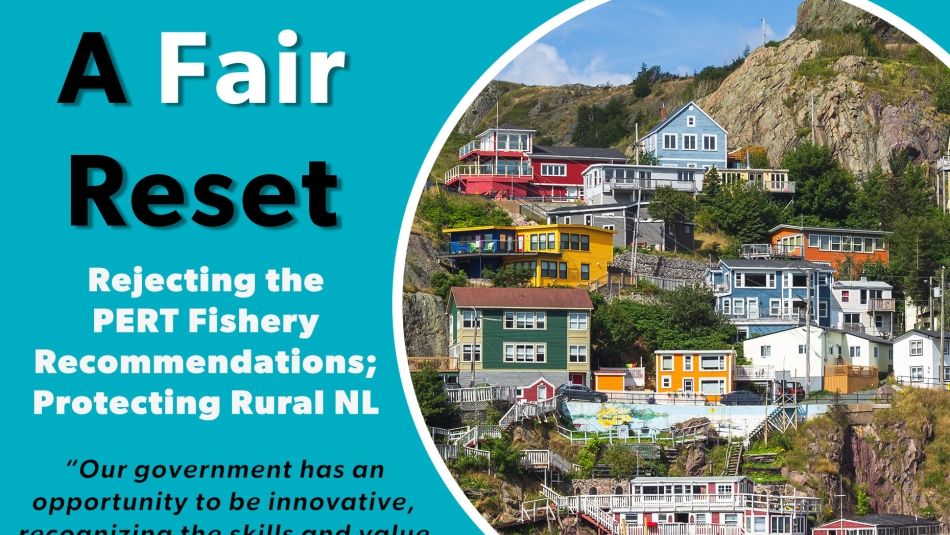
Share
By Lisa Smith, FFAW-Unifor Policy Lead
In the Premier’s Economic Recovery Team Report (better known as the PERT Report or Greene Report), Dame Moya Green recommends corporate concentration in the fisheries as a necessary measure for our economic recovery, but the fishery is already thriving. The industry continues to fuel a prosperous inshore sector with lucrative species, essential employment, and economic benefits that flow to communities throughout the province. Changing that will remove value from Newfoundland and Labrador.
In fact, the 2021 inshore fishery was the most valuable in the history of the province. By the end of August 2021, the current landed value of the inshore fishery was $765,667,721. This does not include landings for squid, and full landing information for cod, capelin, or lobster, which are usually revised upwards later in the year. These profits are currently going directly back into our communities to support a vibrant rural economy.
The Big Reset reports that snow crab stocks are declining. This is a blatant lie.
The Total Allowable Catch (TAC) for 2021 increased 29% from 2020. With the increased quota and historically high prices, it will produce positive economic spin-offs throughout the province. Newfoundland and Labrador will see the impact with investments in infrastructure, services, and local businesses in our coastal communities.
NL already has a regulatory framework that is serving the working people of rural Newfoundland and Labrador well. Implementing the recommendations in the PERT report would change that.
Furthermore, the recommendations insult the hard-working and knowledgeable harvesters, plant workers, and industry professionals of our province. The PERT report uses scare tactics to endorse corporate concentration in direct violation of the celebrated federal government Owner/Operator regulations that came into effect on April 1, 2021. These current regulations are directed at protecting the future of the inshore fishery by prohibiting processing companies from acquiring independent fishing licenses and establishing vertical integration of the inshore fishery. Owner/Operator and Fleet Separation regulations were created to keep the value of the fishery within communities and assert them as the primary beneficiaries of our fishing resources, not corporations. With federal government strategizing a Blue Economy to create jobs in coastal communities while ensuring our oceans remain healthy - these policies must be foundational principles for such a strategy to be successful.
In direct opposition to the above, the PERT Report recommends that the inshore fishery should embrace corporate concentration with fewer jobs and plants across the province. Such corporate control threatens to commodify communities by selling our resources and culture to the highest bidders. Indeed, we are facing new challenges with the economy and the environment, but we are also looking for new opportunities to diversify and find value in new areas. We know that processing plant workers are the backbone of the processing sector and our rural communities, and we have been fighting against corporate concentration in the fishery at every level, advocating for more processing licenses for different companies to foster competition and investment in the industry in Newfoundland and Labrador.
The Report also has the audacity to say that “[t]he relationship between harvesters and processors is often negatively impacted by the collective bargaining structure. This is often at the expense of maximizing value from the market.”
This is another blatant lie.
Collective bargaining ensures protection from power imbalances reminiscent of the merchants of the past. It also maximizes benefit from those harvesting the resource. Since the fishery is not a part of the Competition Act, the right for harvesters to collectively bargain is crucial. The collective bargaining system sets a minimum price for harvesters, it does not in its mandate impact the value of the market.
Political change presents opportunities to constantly re-examine policies, processes, anticipate future trends, and improve past strategies. Our government has an opportunity to be innovative, recognizing the skills and value of our adjacent fish resources to coastal communities, or they can gift it to corporations, and dismantle rural Newfoundland and Labrador.
The Premier’s Economic Recovery Team and the Big Reset are a threat to an industry that is deeply woven into the social and cultural fabric of our province. We must reject these recommendations to protect our inshore fishery and ensure that the economic benefits from our fishery resources stay here, in our coastal communities.


